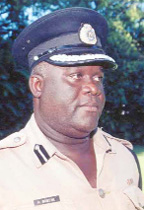Armed motorcycle bandits often pounce on unsuspecting customers who leave city banks with large amounts of money but many continue this unsafe practice which in the past has led to serious injury and even death.

So why is it continuing? A security expert blames the practice on “backwardness” which he believes is being fuelled by the state of the education system and the economy. He said most often in planning and executing a robbery the bandits either hang around banks, choosing their victims or they are supplied with information.
The security expert said that the robbers usually work in pairs and travel on a motorcycle. They often hang around Camp Street, Water Street or Carmichael Street where the banks are situated and look for easy targets.
He explained that they may see a woman in her 60s with a big bag walk into the bank and spend about 45 minutes. When she leaves, they follow her to her home and then she gets out to open her gate. In that unguarded moment, the expert said the men come up, snatch the bag and ride off.
Another scenario he said is workers who get paid weekly and want cash as opposed to the money going to a bank account or getting a cheque.
The employer on the pay day goes to the bank and withdraws the money to pay staff only to have it snatched by a bandit who would have been given information by his girlfriend who is an employee.
The expert further said that there are many cases when customers put money in their car trucks and go to run an errand. On their return the truck is breached and the money gone.
For this year, there have been several cases in which unsuspecting customers have been trailed from banks and then robbed when the opportunity presents itself.
The most recent case occurred at Hope, East Coast Demerara which resulted in the death of Lakeram Bishundial called `Mohan’. The bandits were after a bag of money that Bishundial’s brother Totaram had withdrawn from a city bank to pay off his wedding expenses. Unaware that he (Totaram) was trailed from a city bank, the two brothers who were travelling in opposite directions along the East Coast road, stopped at Hope, to further discuss the wedding plans.
Within minutes of the conversation starting, two bandits rode up on a motorcycle and the pillion rider opened fire on Bishundial, hitting him twice in the abdomen. Totaram jumped into a nearby trench to escape the bullets.
The gunmen then went to Totaram’s vehicle where they grabbed the cash and fled. Investigations led to the capture of three men and the suspected getaway motorcycle. One of the men, Shawn Anthony Thom has since been charged with murder.
Bank employee collusion?
Police Commissioner Henry Greene told Stabroek News recently that in the past there have been proven cases of collusion between bank employees and the bandits. However in recent times there have been no reports of collusion.
“They (the bandits) probably at a distance and they probably got somebody sneaking information. We don’t want to blame the banks but recently we haven’t had any information of collusion. But it has happened in the past”, the commissioner pointed out.
Stabroek News last Wednesday made contact with Sean Noel, the Secretary of the Guyana Association of Bankers (GAB) who said he was not in a position to give an official comment on the matter. He added that a notice will have to be passed to the various banks for them to make comments and that could take several days.
The police during the interview with this newspaper stressed that there are also cases where the bandits stake out the banks.
“I think it’s both. We have had cases where we proved collusion; we have cases in past where we proved that. We have had cases where people stake out. They see you go in and they watch you come out. They watch you with a bag, and then they follow you”, he said.
According to Greene, there have been police stakeouts at banks and this makes it difficult for the bandits to watch and follow unsuspecting customers.
Advice
Greene noted that persons making large withdrawals need to be more security conscious. He advised that customers have security with them.
“You can hire a private security from one of the companies, to go with you, to escort you and take you back to do your business or do it by cheque. Long now the Bankers’ Association has advised that persons do their business by cheques so that they avoid walking with large sums”, he said.
Meanwhile, the security expert this newspaper spoke to said that it is time, Guyana becomes like developed countries where people hardly use cash to transact their business.
“Deal with cheques or plastics (credit and debit cards)!” he said stressing that some hotels overseas for example don’t even want to accept cash from customers.
Asked what might be behind our “walking with cash” culture, the security expert said that many persons in Guyana don’t trust cheques. He said that in the past people “well up in society”, have issued bounced cheques.
Very few persons in Guyana have credit cards. Many persons however are in possession of debit cards. One such customer told Stabroek News that he prefers to make one large withdrawal with the card instead of having to pay an additional fee (to use the card) whenever he goes to buy an item. He explained that using the card every time to shop could amount to a lot; money that can be used to buy something else.





